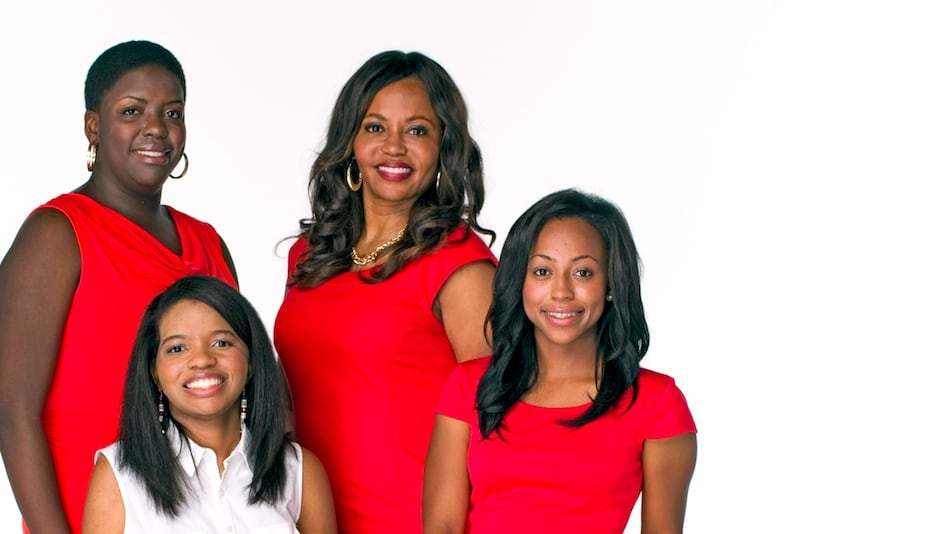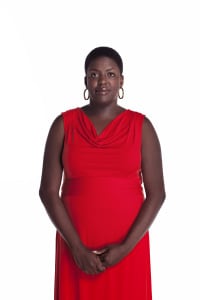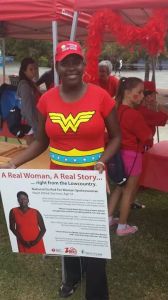
This is the first of two stories showing sisters facing down heart disease and winning. The series is part of Fierce’s celebration of the American Heart Association’s Go Red for Women Campaign. You can also hear what they have to say in the video below.

“I thought heart attacks were for older people or obese people,” Keisha Hawes said. (Photo: American Heart Association)
By any measure, Keisha Hawes and her husband, Michael, were going through a rough patch in late 2010. With the country still reeling from the Great Recession, the couple was struggling with the financial pressures of raising their two young children, Madison and Morrison, in Charleston, S.C.
“I was out of work for months,” Hawes says. “I eventually got a job as a server on the breakfast shift at a local hotel restaurant, but I was only making minimum wage plus tips.”
Undaunted, the 31-year-old college graduate was determined to increase her income. “The hospitality industry has a high rate of turnover, so whenever someone else left a part-time job in the hotel, I’d apply for it and take on another position,” she says.
Within months, Hawes had cobbled together five part-time jobs to make ends meet. To save money, she also decided to stop taking the medication that had kept her diabetes under control since she was diagnosed at age 18. “I was tired of course, but I felt fine,” Hawes says, noting that her weight was also in a normal range so she did not think it would be a problem.
Signs of Trouble
As the months passed, Hawes would slip into a pattern that cardiologist Michelle Albert, M.D., says reflects the lack of awareness many black women have about their heart disease risks. At that time, Hawes had no idea that more than 49 percent of black women over age 20 have some sign of heart disease. “We also have a more than 50 percent chance of losing our lives to a first heart attack,” Dr. Albert says.
Focused on getting from job to job, while searching for new opportunities, Hawes recalls, “every now and then, I would feel a little short of breath or my heart would skip a beat. But I thought it was just anxiety.”
One evening, after a particularly stressful day, Hawes pulled into the parking lot of McDonald’s for a generous helping of comfort food. “I ordered a combo and ate in my car, so when I started to have chest pain, I was sure it was just indigestion,” she says.
Like millions of women, Hawes never associated the nausea and discomfort she felt during the drive home with a heart attack. Exhausted, she got into bed seeking the healing power of a good night’s sleep. “I expected to just doze off, but the chest pain would not stop. It felt like someone was choking me.”
As her heart began skipping beats, dizziness set in and she began to sweat, Hawes was still convinced that her fast-food binge was the problem. She was so sure she would be fine, she begged her worried husband to stay home with the kids and drove herself to the hospital.
“They say God protects fools and children, so he was good to this fool that night,” she says quietly. “I know I blacked out at least once behind the wheel, but somehow I got to the emergency room.”
After a long night of tests, Hawes finally got a diagnosis. “The doctor announced that he was going to either put a stent in my heart or do a bypass, and I just lost it,” she recalls. “I said, ‘What are you talking about? I’m 31 years old! I don’t even have time for a heart attack. I’ve got to get home to my kids.’ I thought heart attacks were for older people or obese people. I could not believe it.“
Stress and Your Heart
Tests would reveal that one of Dawe’s arteries had a 95 percent blockage. Her untreated diabetes, combined with near constant stress, had pushed her body over the edge.
High cholesterol, diabetes and hypertension are the three heart disease risks factors most women have on their radar, but like Hawes, millions of black women are still in the dark about the impact of stress.
“The only contributors to heart disease that top chronic psychological stress are high blood pressure and cholesterol,” says Dr. Albert, chief of cardiovascular medicine and director of cardiovascular research at Howard University.
In 2010, she led a study looking at how job stress affected more than 17,000 women. “We discovered that women with high-demand jobs had double the risk of heart attack — nearly 90 percent higher — than women with lower stress jobs. They were also 40 percent more likely to have procedures such as bypass surgery than women with low-demand jobs,” Dr. Albert explains. The women with highest risk were those in jobs with high pressure, where they also had high job control (such as physicians).
But, Dr. Albert adds: “Work-related stress is not the only issue. Caregiving, relationship issues and racial discrimination all contribute.”
Did You Know?
Women with high stress jobs have up to a 90 percent higher risk of heart attack than women with low stress jobs.
■ Read: 10 Tips for a Heart Health Life
■ Learn more at: Go Red for Women
The Culture Connection
Research showing a link between high blood pressure — a major contributor to heart disease — and discrimination underscore Dr. Albert’s point. Midlife African American women who experienced racial discrimination had an immediate rise in their blood pressure, a 2001 study found. And blacks who were hyper-vigilant about encountering racism had significantly higher blood pressure than the whites in a 2013 study, conducted by Margaret Hicken, Ph.D., an expert on racial disparities and health.
“We think that the chronic activation of the biological stress response system that takes place when a person anticipates a negative event like encountering discrimination is what contributed to the higher rates of hypertension among the blacks in our study,” Hicken explains.
Blood pressure is a particularly important marker for heart disease for black women, because we are 1.6 times more likely than whites to have high blood pressure.
Our resistance to seeing a therapist or asking for help when depressed or overwhelmed only adds to the pressure, an issue Hawes understands. “Even when I was working five jobs, I did not want to ask my family for help,” she says.
The other great concern, Dr. Albert points out, is that levels of awareness are so low among black women. Lori Mosca, M.D., director of preventive cardiology at Columbia University Medical center, conducted a recent survey of more than 2,000 women and found that only 36 percent of black women were aware of their chances of developing heart disease.
A Second Chance
Surgeons placed a stent in Hawes’ heart to clear the blockage, but she understood that the rest was up to her. She knew she needed to change her habits, including a love of soul food, Her greatest inspiration was the desire to protect her 8-year-old daughter, Madison, from the health risks shared by the women in the family. Hawes grandmother was also a diabetic. “I was very concerned about my children, so I signed Madison up for Black Girls Run. I didn’t grow up around people who exercised, so I never would have thought that I could run too. I just went along to volunteer. But then I looked at all of those women on their Facebook page who were doing incredible things and I realized it was possible.”
For the Hawes clan, working out is now a family affair. “These days, I’m a lower-case runner, but I’m an upper-case walker and my children run with me,” says Hawes, now 34, who punctuates nearly every sentence with warm, rolling laughter as she talks about her new lease on life. “I also eat better and I have learned to say a magic word: ‘No.’”
Her new habits have done wonders for her health. About a year after her stent surgery, Hawes once again found herself having chest pains. “This time I had someone take me to the hospital,” she says. As the nurse entered the room to deliver her test results, Hawes braced for the worse. Then she noticed the woman was smiling.
“She said, ‘Congratulations. You’re pregnant,’” Hawes recalls. “It really was indigestion after all. Throughout my pregnancy, I got great medical care, I took my insulin and other medication, and I did not gain much weight.” Her reward was a healthy baby boy. Little Morrison is now just a little more than one years old and Hawes says she can’t wait until he’s big enough to join the family running team.
Sheree Crute is editor-in-chief and co-founder of FierceforBlackWomen.com.







